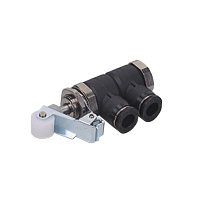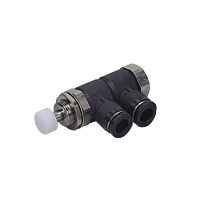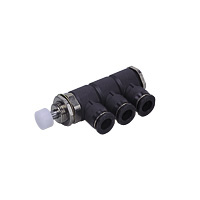(!) Since support from Microsoft will end on January 14 2020, Windows 7 user might not be able to use MISUMI website effectively. Please consider to update your system as ‘MISUMI Website system requirement’.
- แจ้งวันหยุดทำการในเดือน กรกฎาคมและสิงหาคม 2567 | Notice holiday in July and August 2024 > คลิก
PISCO Manual Switching Valves(Main Body Shape:Pin Shape)
Configure
Specification/Dimensions
-
Number of Switching Positions
- 2-Position Normally Open
- 2-Position Normally Closed
- 2-Position Exhaust
- 3-Position Closed Center
- 3-Position Exhaust Center
- 2-Position Direction Switching
- Others
-
Number of Ports
- 2-Port
- 3-Port
- 4-Port
- 5-Port
-
Switching Operation
- Manual Lever
- Plungers
- Push Button
- Toggle Switches
- Knob
- Selecting Knob
- Selector Knob with Key
- Foot Switches
- Pilot-Operated
- Others
-
Main Body Shape
- Block Vertical Type
- Block Horizontal Type
- Micro Switch Type
- One-Touch Fitting Type
- Pin Shape
- Pedal Shape
- Others
-
Plumbing Thread Nominal
- M5
- 1/8
- 1/4
- 3/8
- 1/2
- 3/4
-
Pipe Port Type
- M
- Rc (R)
- One-Touch Plumbing
-
Connecting Tube Diameter
- Ø4
- Ø6
- Ø8
- Ø10
- Ø12
-
Plumbing Type and Direction
- Direct Side Surface
- Direct Bottom Surface
-
Effective Sectional Area(mm2)
-
Mounting Method
Brand |
|
|---|---|
Filter By |
|
| CAD |
|
- 4 items
- Sort By
-
You can add up to 6 items per a category to the compare list.

Mechanical Switching Valves Mechanical Valve Panel Mount Type Roller
PISCO
Push-type pneumatic pressure input on-off valve.From: ฿ 895.27 Days to Ship: 10 Day(s)
10 Day(s)
-
You can add up to 6 items per a category to the compare list.

 Until 31/03/2025
Until 31/03/2025 Until 31/03/2025
Until 31/03/2025Mechanical Switching Valve, Mechanical Valve, Panel Mount Type, Pin Type
PISCO
[Features]
· Push-type pneumatic press-fit on/off valve.
· Spool valve mechanism ensures ease of operation not affected by pressure.
· Features 3-way valve with exhaust function and 2-way valve without exhaust function.
· The panel-mounted type with fitting part rotation enables the direction of tube connection to be set freely.From: ฿ 749.54 Special Price Days to Ship: Same day
Same day
-
You can add up to 6 items per a category to the compare list.

 Until 31/03/2025
Until 31/03/2025 Until 31/03/2025
Until 31/03/2025Mechanical Switching Valves Mechanical Valve Panel Mount Type Pin (Concentrated Exhaust Type)
PISCO
Push-type pneumatic pressure input on-off valve.From: ฿ 970.06 Special Price Days to Ship: Same day
Same day
-
You can add up to 6 items per a category to the compare list.

Mechanical Valve Panel Mount Type Roller (Concentrated Exhaust Type)
PISCO
Push-type pneumatic pressure input on-off valve.From: ฿ 931.36 Days to Ship: 10 Day(s)
10 Day(s)
| Brand |
|---|
| Product Series |
| CAD |
| From |
| Days to Ship |
| Number of Switching Positions |
| Number of Ports |
| Switching Operation |
| Main Body Shape |
| Plumbing Thread Nominal |
| Pipe Port Type |
| Connecting Tube Diameter |
| Plumbing Type and Direction |
| Effective Sectional Area(mm2) |
| Mounting Method |
You can add up to 6 items per a category to the compare list. | You can add up to 6 items per a category to the compare list. | You can add up to 6 items per a category to the compare list. | You can add up to 6 items per a category to the compare list. | |
| Brand | PISCO | PISCO | PISCO | PISCO |
| Product Series | Mechanical Switching Valves Mechanical Valve Panel Mount Type Roller | Mechanical Switching Valve, Mechanical Valve, Panel Mount Type, Pin Type | Mechanical Switching Valves Mechanical Valve Panel Mount Type Pin (Concentrated Exhaust Type) | Mechanical Valve Panel Mount Type Roller (Concentrated Exhaust Type) |
| CAD |
|
|
|
|
| From | ฿ 895.27 | ฿ 749.54 Special Price On Sale Until 31/03/2025 | ฿ 970.06 Special Price On Sale Until 31/03/2025 | ฿ 931.36 |
| Days to Ship | 10 Day(s) | Same day | Same day | 10 Day(s) |
| Number of Switching Positions | 2-Position Normally Closed | 2-Position Normally Closed | 2-Position Normally Closed | 2-Position Normally Closed |
| Number of Ports | 2-Port / 3-Port | 2-Port / 3-Port | 3-Port | 3-Port |
| Switching Operation | Plungers | Push Button | Push Button | Plungers |
| Main Body Shape | Pin Shape | Pin Shape | Pin Shape | Pin Shape |
| Plumbing Thread Nominal | - | - | - | - |
| Pipe Port Type | One-Touch Plumbing | One-Touch Plumbing | One-Touch Plumbing | One-Touch Plumbing |
| Connecting Tube Diameter | Ø4 / Ø6 | Ø4 / Ø6 | Ø4 / Ø6 | Ø4 / Ø6 |
| Plumbing Type and Direction | - | - | - | - |
| Effective Sectional Area(mm2) | 3 ~ 5 | 3 ~ 5 | 3 ~ 5 | 3 ~ 5 |
| Mounting Method | Panel Mount | Panel Mount | Panel Mount | Panel Mount |
Loading...
Application example related to this category
Related Categories to Manual Switching Valves
FAQ Manual Switching Valves
- Question: What are manual switching valves and how do they work?
- Answer: Manual switching valves are components used in pneumatic or hydraulic systems to manually control the direction of flow. They typically feature between 2 to 6 connection ports and can switch flow directions in multiple ways (usually 3 to 6). These valves are operated by levers, buttons, or knobs, which direct the flow of air or oil to different parts of the system. Lever-operated models switch the flow in the direction the lever is moved, and various configurations are available to fit different system requirements.
- Question: How do I choose the right manual switching valve for my application?
- Answer: Selecting the correct manual switching valve depends on several factors:
Number of Ports: Choose based on the required number of connections (2, 3, 4, or 5-port).
Switching Positions: Determine if you need 2-position (normally open or closed), 3-position (closed or exhaust center), etc.
Operation Type: Decide between lever, push button, toggle switch, or knob operations based on your system's control needs.
Mounting Type: Select from panel-mounted, block vertical/horizontal types, or other specific configurations.
Plumbing Thread Nominal and Pipe Port Type: Ensure compatibility with existing plumbing, with options like M, Rc (R), or one-touch plumbing.
Effective Sectional Area: Consider the valve's capacity to handle the flow rate required by your system. - Question: What are the common applications of manual switching valves?
- Answer: Manual switching valves are widely used in various industries for:
Pneumatic Systems: Controlling air cylinders and pneumatic circuits.
Hydraulic Systems: Managing fluid flow in hydraulic equipment.
Industrial Automation: Simplifying the control of complex machinery and production lines.
Medical Devices: Precise control in medical and laboratory equipment. - Question: What are the advantages of using manual switching valves?
- Answer: Simplicity: Easy to operate without requiring electrical control.
Reliability: Robust design ensures dependable performance, even with some contaminants in the line.
Versatility: Available in various configurations to suit different applications.
Compactness: Typically designed to be space-saving while providing effective control. - Question: How do manual switching valves handle contaminants?
- Answer: Manual switching valves used in pneumatic lines are designed to operate reliably even with some contaminants present. The robust construction and materials ensure that the valve does not fail easily due to particulate matter in the air or fluid.
- Question: Can I use manual switching valves for high-pressure applications?
- Answer: Yes, certain manual switching valves are designed for high-pressure environments. It is crucial to check the valve specifications for maximum pressure ratings to ensure compatibility with your system's requirements.
- Question: Are there specific maintenance requirements for manual switching valves?
- Answer: Manual switching valves generally require minimal maintenance. Regular inspections for wear and tear, cleaning of external surfaces, and ensuring connections are tight can help maintain optimal performance. For specific models, refer to the manufacturer’s maintenance guidelines.
















How can we improve?
How can we improve?